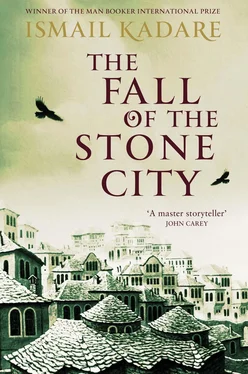He would have given anything to know the truth.
A week later he happened to find himself alone with the prisoner, against all regulations. He had never broken a rule before, but his conscience was easy. This infraction did no harm to the State.
He spoke quietly to the prisoner, as if at a routine interrogation of an ordinary suspect. He mentioned his fiancée’s name and added that she was a young woman of twenty-four. According to the hospital register she had attended her appointment at four thirty on the afternoon of 17 February 1951.
The prisoner had furrowed his brow and said that he couldn’t remember her.
She was an ordinary-looking woman of medium build.
The doctor shook his head again.
“Try to remember, doctor,” said Shaqo Mezini, noticing with alarm his own altered voice. The anxiety of those unforgotten weeks flooded over him again. “Doctor, please,” he entreated in a muffled voice. “Tell me out of human kindness. . she was my fiancée.”
The prisoner made no sign.
“You don’t remember? Of course you don’t. She wouldn’t strike you in any way. She was an ordinary woman. She was no great beauty.”
Shaqo Mezini sat down and his voice became colder and more threatening. “Why did she come to you? Why shouldn’t I know the reason? Did she complain about me? Speak!”
The prisoner still sat speechless.
“At least tell me what was wrong with her. Just listen to me. What was the problem?”
“I can’t remember.”
“Really?”
“Even if she did come to me, I wouldn’t tell you. It’s a matter of confidentiality.”
“Monster,” Shaqo Mezini said to himself. “Heartless monster. Hun.”
At all the later sessions he tried to avert his eyes from the prisoner’s right hand.
On 3 March before dawn he had given the order for the prisoner to be put to torture. He had gone to the chief operative named Tule Balloma. “Listen, there’s something on my mind. Those two fingers, the index finger and the next one, what do you call it. Give them a good twist.”
The operative looked at him strangely. “There are other parts that hurt more, boss.”
“I know, I know,” he had replied. “But it’s those I want. Crush them good and proper.”
“Don’t worry, boss. You’ll see.”
He was curious to see the result, although it would be small consolation.
For two years he had brooded on his fiancée’s desertion. He never imagined that just at the time when the scar was healing, the investigation of the doctors would lay bare this wound again. When they had assigned him to this case its global dimensions had staggered him. Simultaneously there came a pang: it was too late. If this had come earlier perhaps his fiancée would not have left him. The file contained something for which he had subconsciously yearned, the promise of celebrity.
The Dzerzhinsky Academy, which of all institutions should have cultivated an indifference to fame and the charms of women, surreptitiously offered these inducements. Forbidden lust haunted the cadets’ nightly dreams. Their officers, who knew every secret, could not fail to understand this, but astonishingly, instead of discouraging these desires, they openly hinted that they could hold the entire world in their hands if they knew how to reach out for it. The sons of Stalin would drown the world in blood. The world with its temples, cathedrals, its men and glamorous women, would kneel before them.
His fiancée had proved resistant to this fantasy. At the first supper at her home, supposedly by accident, he had let her see his pistol as he took off his jacket, but to no effect. She had shown no curiosity but only an obvious disdain for firearms.
His eventual fame would no doubt change this and he would become attractive to women, like the commissars with their leather jackets and scars on their foreheads. Or the surgeons who knew how to handle them. If only he too could be somebody. The young Ali Pasha Tepelene supposedly said that if he had been vezir, he would not have allowed the men of Kardhiq to ravish his sister, and from that day his sole ambition had been to become vezir, to take his revenge.
Shaqo Mezini seemed about to become a star at the precise moment in his life when it was of no use to him. He had known this instinctively as soon as he heard the radio broadcasts about the plot, when the newspapers with their banner headlines arrived, and later, as he watched the German investigator striding across the windswept tarmac to the airport building. Later, fame seemed to draw a little closer every day and came almost within his grasp, as it had on those heady evenings at the Dzerzhinsky Academy. Dozens of his student friends from Berlin to Ulan Bator were no doubt at the same time investigating the same repellent case. But destiny shone more brightly on him than on anyone else. His dream of becoming the most famous investigator of the socialist camp was about to become a reality: Shaqo Mezini, the thirty-year-old Albanian sleuth. There would be interviews, meetings with young pioneers and congress delegations. “Comrade Stalin, this is Shaqo Mezini, who exposed the famous ‘Joint’.” Then Stalin would invite him to supper and perhaps even talk to him tête-à-tête.
His intoxicated imagination stopped short before this climax. He was content to leave the details vague. At times, the scene of another supper threatened to superimpose itself, Christ’s perhaps. He knew about this from the Bible, which he had read and even underlined in red pencil while investigating Father Foti, the priest of Varosh. But more than anything else he remembered Gurameto’s dinner, which had started it all. He saw himself present sometimes as the man who was to arrest the mysterious guest and sometimes as this very guest himself, the all-powerful visitant from the grave.
Don’t give up, he thought. There is still hope.
It was 4 March and Stalin was still alive. Towards dawn they tortured Gurameto again. The operatives were sure he would sign.
The day was overcast with frozen clouds shot through with a deceptive light. The radio carried classical music interspersed with listeners’ letters and statements from meetings of workers and soldiers. Wishes for a speedy recovery, threats to our enemies.
The verses published in the press all mentioned Stalin’s laboured breathing. Everybody thought he was at his last gasp.
Gurameto’s torture continued till dawn. The investigators no longer waited for anybody’s instructions. Late in the afternoon they searched his house again and seized his gramophone and records. Among them they found Schubert’s “Death and the Maiden”, mentioned in the statements. They played it while the torture continued.
For the prophecy to be fulfilled, the dead colonel’s words had to come true. “‘You’ll hear this music differently.’ Do you remember him saying that?”
Shaqo Mezini rambled as if in a fever. Arian Ciu listened to him impassively, alarmed by his colleague’s recourse to the Bible.
After two hours they both went to the hospital to fetch the surgical instruments that Gurameto had brought from Germany, each one with the initial “G” engraved on it. Arian Ciu did not need his colleague to explain that they would torture Gurameto with his own tools, to fulfil the other prophecy, seen in his dream, that he would be operated on with his own scalpels.
The news of Stalin’s death was broadcast shortly before noon. Shaqo Mezini was lying half-dressed on his bed after a strenuous night in the Cave of Sanisha when he felt his mother’s hand touch his shoulder. “Shaqo, Shaqo,” she said in a low voice. “Get up! He’s dead.”
He leaped to his feet, seized first his revolver from the bedhead and then his overcoat, bounded down the stairs in twos and threes and ran out into the street.
Читать дальше












